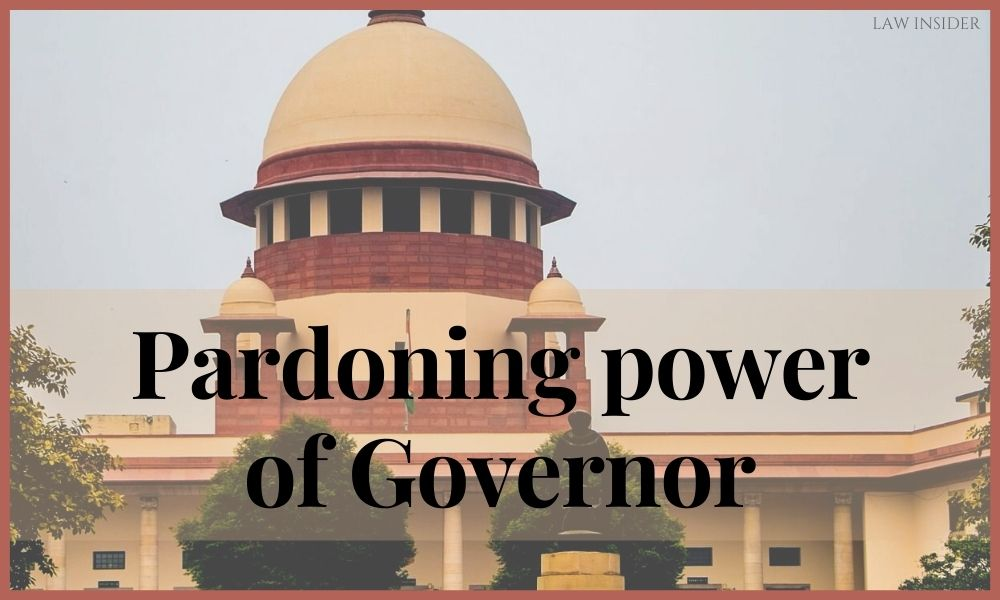Description

Copyright infringement not intended
Context - The Supreme Court advised the Union government to release the convict in the former Prime Minister Rajiv Gandhi's assassination case, as he already served a sentence of more than three decades.
Details
- The Supreme Court has advised the Union government to act against the Tamil Nadu Governor who chose to “ignore” the State Cabinet’s binding advice to release a convict.
- The Governor ignored the state cabinet's advice by highlighting that the President had the authority to decide on the mercy plea.
Governor
- Part VI of the Indian Constitution deals with the State government.
- Articles 153 to 167 in Part VI of the Constitution deal with the state executive. The state executive consists of;
- The Governor
- The Chief Minister
- The Council of Ministers
- The Advocate General of State.
- The office of the governor has a dual role;
- The Governor is the chief executive head of the State.
- The Governor also acts as an agent of the central government.
- Normally, there is a governor for each state, but the 7th Constitutional Amendment Act of 1956 enabled the appointment of the same person as a Governor for 2 or more states.
- Governor is appointed by the president by warrant under his hand and seal.
- It is an independent constitutional office and is not under the control of or subordinate to the Central government.
Pardoning Power of the Governor
- Under Article 161 of the Indian Constitution, the Governor of a state can grant; Pardons, Reprives, Respites and Remissions of punishment or Suspend, Remit and Commute the sentence of any person convicted of any offence against any State law.
- Earlier, the Governor cannot pardon the death sentence that was the exclusive power of the Indian President. But in August 2021, the Supreme Court held that the Governor of a State can pardon prisoners; including death row ones, even before they have served a minimum of 14 years of a prison sentence.
- Pardon:
- It removes both the sentence and the conviction and completely forgives the convict from all sentences, punishments and disqualifications.
- Commutation:
- It denotes the substitution of one form of punishment for a lighter form.
- For example, a death sentence may be commuted to life imprisonment.
- Remission:
- It indicates reducing the period of a sentence without changing its character.
- For example, a sentence of imprisonment for two years may be remitted to imprisonment for one year.
- Respite:
- It suggests awarding a lesser sentence in place of originally awarded due to some special fact, such as the physical disability of a convict or the pregnancy of a woman offender.
- Reprieve:
- It means a stay of the execution of a sentence (especially that of death) for a temporary period.
- Its purpose is to enable the convict to have time to seek pardon or commutation from the Governor/President.
Comparison between Pardoning Powers of President and Governor
|
President
|
Governor
|
|
● Authority to pardon, reprieve, respite, remit, suspend, or commute the punishment or sentence of any person convicted of a violation of a Central law.
|
● Authority to pardon, reprieve, respite, remit, suspend, or commute the punishment or sentence of anyone who has been convicted of an offence against state law.
|
|
● Authority to pardon, reprieve, respite, remit, suspend, or commute a death sentence.
● The sole authority to pardon a death sentence.
|
● He is unable to pardon the death sentence. Even if a state law calls for the death penalty, the President, not the governor, has the authority to grant a pardon.
● However, the governor has the authority to suspend, remit, or commute a death sentence.
|
|
● Authority to grant pardon, reprieve, respite, suspension, remission, or commutation of punishment or sentence imposed by a court-martial (military court).
|
● He doesn't have this kind of power.
|
https://www.thehindu.com/news/national/supreme-court-asks-centre-why-rajiv-gandhi-case-convict-perarivalan-cannot-be-released/article65359557.ece














